
Need a DXF file making from these pics
wilkingj - 12/11/11 at 04:32 PM
I am trying to make a High Voltage Capacitor (in the region of 10-12Kv)
I need to get these drawings turned into a DXF file, then find someone who can laser / water cut them.
Its 1mm Ally.
I am not sure which would be best laser or water cut. I need the edges to be as smooth as possible, as jagged spikes etc, will allow any high voltage
flash overs to happen at a lower voltage.
Basicaly I expect to have to sand them all down, but obviously want to reduce the workload as much as possible.
Can anyone help, with either the DXF files (assuming thats what I need for a cutter to use) or with the actual cutting.
I recon about 10 rotors, and 22 stators and 2 end plates.
Anyone able to even give me a price?
For the curious, its a high voltage tuning capacitor for a Magnetic Loop antenna, and will be remotely turned by a very very slow motion 12v motor
(2RPM) thru a 5:1 reduction gerabox.
Just so you know!
All thoughts appreciated.
Geoff

The Stator Plate
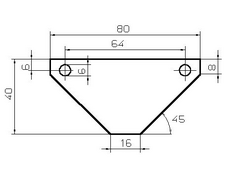

Capacitor Stator
The Rotor plate
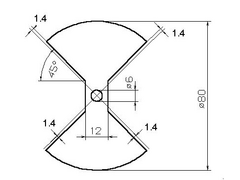

Capacitor Rotor
The End Plate
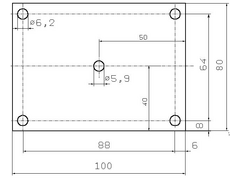

Capacitor End Plate
HowardB - 12/11/11 at 05:25 PM
does that make you an amateur?
de G0VTL
dave r - 12/11/11 at 05:27 PM
i knew geoff was one something ddx, i think
g0pys
luke - 12/11/11 at 05:31 PM
I can draw these up for you if you havent sorted an offer yet?
trextr7monkey - 12/11/11 at 08:04 PM
Geoff did you ever get the 2d design programme to work as it saves files as DXF.?
We have a small cnc router and a micro mill but never used them on ali- always wood and plastic, also have an old Camm 2 which would do it. The
finish from the machines id pretty smooth and accurate
I could probably have a look at it mid to late week apart from we haven't any ali that thin and we are a bit pushed time wise. If you can find
someone else to do it then it isn't a problem 
It is a pity you aren't closer as you could have come in for a bit of training and a twiddle!
atb
Mike
andyw7de - 12/11/11 at 09:01 PM
I can draw them and cut them for you...
Ill sort out a price for you on monday if thats not too late
cheers
Andy
gingerprince - 12/11/11 at 11:10 PM
You building a time machine?
Oh, it's not a Flux capacitor?

[Edited on 12/11/11 by gingerprince]
wilkingj - 13/11/11 at 12:09 AM
Ah Yes I am G0DDX.
Now I am retired, I am playing radio's a lot more.
(Kit Car in Summer and Radio's in Winter - Inside and Outside Hobbies, ideal for the retired to be able to play all year round)
The problem with small loop antennas is they generate several thousand volts on them, and usually in the capacitor.
Making you own is a good way to do this as you can make the size you want, rather than use what you can find or buy.
I have U2U'd Andy, and see how that goes.
I'm not in a tearing hurry, but want to crack on with the job.
Cheers

Dingz - 17/11/11 at 11:35 PM
Have you got this sorted? I can do you a .dxf if you want.
wilkingj - 15/12/11 at 12:10 AM
Yes, andyw7de has done a fine job.
I have now assembled the parts and here is a picture of the finished Butterfly Capacitor.
It should withstand up to 12Kv, as you get a double gap with this style of capacitor, and very low losses when using it in a loop antenna. Also no
connection to the rotot shaft either which can be very lossy in this application.
I havent finished the motorisation of the capacitor yet. I have a 2rpm 12v motor, and then a 6:1 reduction drive to go on that, as it needs to turn
very very slowly, due to the tuning being very sharp indeed.
For the Radio Amateurs amongst us:
I knocked up a quick loop using 2.6metres of Heliax LDF450 cable (was lying about spare in the shed).
I hung it over the fan blades inside the shack, and managed to contact a mate of mine in Finland on just 5Watts of power.
It was just one S point (sig strength) below my 130ft wire which is outside. The loop is inside the building, so I am well impressed.
The antenna covers 14-30Mhz, and has a SWR of better than 1.5:1 on all amateur bands.
At 14Mhz, and using the legal power limit, the voltage across the capacitor is about 5,553 volts RMS and the resonant circulating current is 43.4 A.
Not something to touch when transmitting. (this is a resonant circuit so you get massive voltages and currents when tuned)
So far I have made one mistake. I bought some good quality 6mm PVC for the end plates. Evidently I should have used polyproplyene chopping boards from
Poundland, cheaper and better electrical properties.
Downside is they are only about 3mm thick and not 6mm. I used 2 x 6mm PCV plates to locate and secure the bearings which are for Skateboards. A bit
OTT, but were the cheapest I could find.
Used over 80 stainless steel nuts and nearly a metre of M6 Stainless Steel studding.
SS has less iron content and less magnetic effects. Brass would be best but even more expensive!
Remember I'm a Locoster at heart.
More pics to follow when I get the motorisation sorted.
I had to make up a 6mm male round to M6 female thread adaptor today for the motor. The Myford ML7 made it a cinch, even if id screw the first one up!
My ML is not in the best of health, ie its old and a bit worn. Still, its good for knocking out spacers and small parts that dont need high accuracy /
tolerance etc.
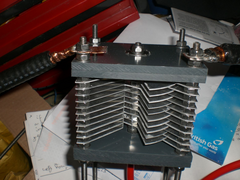

Capacitor completed
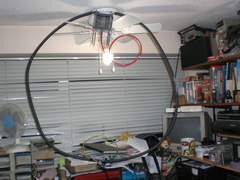

Magnetic Loop Antenna
mcerd1 - 15/12/11 at 08:52 AM
quote:
Originally posted by wilkingj
So far I have made one mistake. I bought some good quality 6mm PVC for the end plates. Evidently I should have used polyproplyene chopping boards from
Poundland, cheaper and better electrical properties.
Downside is they are only about 3mm thick and not 6mm. I used 2 x 6mm PCV plates to locate and secure the bearings which are for Skateboards. A bit
OTT, but were the cheapest I could find.
Used over 80 stainless steel nuts and nearly a metre of M6 Stainless Steel studding.
SS has less iron content and less magnetic effects. Brass would be best but even more expensive!
Remember I'm a Locoster at heart.
most of this stuff goes right over my head 
but I've come across this whole non-magnetic thing a few times at work (HV eletrical substations)
I'm guessing that your using austenitic staniles rod and nuts like A2-70 (austonite is an iron cristal structure where the effectivly stop
behaving magnetically) - this is normally good enough for our customers whao are just trying to stop circulating currents in the support
structures...
if you need something better could you not use alloy spacers, with a smaller rod throught the middle (also alloy with the end threaded) to pull it all
together - a bit of making in the spacers but they'd be alot cheaper than brass and even less magnetic than stainless
as for plastic our customers tend to want PTFE, but thats not cheap 
so we found that in alot of cases they would accept high density polythene (HDPE) - which you can get as dirt cheap recycled stuff 
[Edited on 15/12/2011 by mcerd1]










